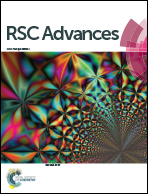Efficient resolution of 3-aryloxy-1,2-propanediols using CLEA-YCJ01 with high enantioselectivity†
Abstract
The lipase YCJ01 from Burkholderia ambifaria is an organic solvent-stable enzyme and its activity can be activated by a hydrophobic solvent due to the “interface activation” mechanism. The activity of lipase YCJ01 increased by 2.1-fold with t-butanol as the precipitant even after cross-linking. The cross-linked enzyme aggregates of lipase YCJ01 (CLEAs-YCJ01) were found to be efficient for resolving 3-(4-methylphenoxy)-1,2-propanediol (MPPD) through sequential esterification. Excellent enantioselectivity towards MPPD (E > 400), excellent enantiomeric excess (ee) values of 99.2% for S-diacetates and 99.1% for R-monoacetate, and high yield (49.9%) were achieved using a high substrate concentration (180 mmol L−1). Thus, R- and S-type compounds with excellent ee values were simultaneously obtained, and MPPD was resolved by CLEAs-YCJ01. CLEAs-YCJ01 also showed high operational stability and maintained 91.2% residual activity after ten batches. To further evaluate the substrate specificity of CLEAs-YCJ01, a series of 3-aryloxy-1,2-propanediols (six analogues of MPPD) was applied as substrates for resolution. Under the optimized reaction conditions of reaction temperature of 35 °C, MPPD concentration of 180 mmol L−1, molar ratio of vinyl acetate to MPPD of 3 : 1, and isopropyl ether as the solvent, CLEAs-YCJ01 exhibited relatively strict enantioselectivity towards all the analogues of MPPD with a high yield (≥49.3%), favourable ee values (94.8–99.4%) for S-diacetates, and high ee values (92.1–99.2%) for R-monoacetate, which shows potential prospects for industrial applications.



 Please wait while we load your content...
Please wait while we load your content...